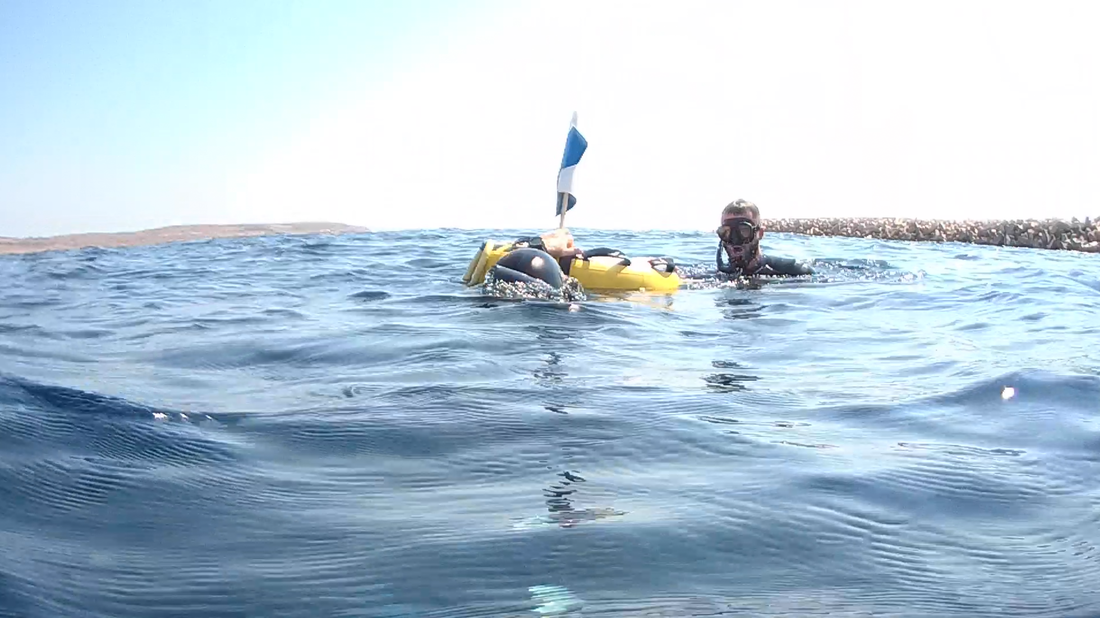One thing that I get asked about by students and customers often, or find that there is a lot of confusion around, is sea conditions and how the weather effects us as free divers. When I talk about "waiting to see how the weather is on X day" a new diver or non-diver will often think about if the sun is out or if it might rain, which is of much less importance to us than the wind strength. Lets be clear: freediving in strong wind is not fun! For scuba divers, they can get in and go down and not feel the effects too much, while trying to relax on the surface can be quite a challenge in even moderate wind or chop.
So lets look at 4 of the main sea conditions that can be experienced:
Wind (Chop): The effect of the wind passing horizontally over the surface of the water causes localised waves which can range from small and insignificant to large and powerful (see Beaufort Wind Scale). Wind does not necessarily cause sea current and can often be in completely the opposite direction!
Wikipedia WIND information HERE
Tide: The rising and falling of the sea, usually twice in one lunar day due to the attraction between the moon and sun. Therefore tides are a predictable factor and in many parts of the world regularly updated and accurate 'Tide Tables' are available, mainly to help with shipping and other sea traffic.
Fact: The Mediterranean Sea does not get strong tides due to the narrow inlet at the Straits of Gibraltar that connects it to The Atlantic Ocean.
Wikipedia TIDE information HERE
Current: The movement of the water, often in a horizontal direction, often caused by water temperature differences. There can be ocean currents on a predictable global scale as well as more local currents
Wikipedia CURRENT information HERE
NOAA information HERE
Swell: This comes from distant weather conditions rather than local. Often in the sea it is experienced as the residual effect after a period of strong wind, where it is no longer locally windy but there is still a distinct up and down movement of the water, most noticeable on the shore line. Swell can travel thousands of kilometres through the sea.
Wikipedia SWELL information HERE
To efficiently read the weather, an app such as Windfinder (and more so the 'Pro' version which gives more detailed information). is a must for anyone that is in or on the sea on a regular basis. Also, the use of the 'Beaufort Wind Scale' is an invaluable way to gauge prevailing wind conditions purely by sight. Wikipedia information HERE
I hope you found this blog post interesting, let me know your thoughts in the comments.
So lets look at 4 of the main sea conditions that can be experienced:
Wind (Chop): The effect of the wind passing horizontally over the surface of the water causes localised waves which can range from small and insignificant to large and powerful (see Beaufort Wind Scale). Wind does not necessarily cause sea current and can often be in completely the opposite direction!
Wikipedia WIND information HERE
Tide: The rising and falling of the sea, usually twice in one lunar day due to the attraction between the moon and sun. Therefore tides are a predictable factor and in many parts of the world regularly updated and accurate 'Tide Tables' are available, mainly to help with shipping and other sea traffic.
Fact: The Mediterranean Sea does not get strong tides due to the narrow inlet at the Straits of Gibraltar that connects it to The Atlantic Ocean.
Wikipedia TIDE information HERE
Current: The movement of the water, often in a horizontal direction, often caused by water temperature differences. There can be ocean currents on a predictable global scale as well as more local currents
Wikipedia CURRENT information HERE
NOAA information HERE
Swell: This comes from distant weather conditions rather than local. Often in the sea it is experienced as the residual effect after a period of strong wind, where it is no longer locally windy but there is still a distinct up and down movement of the water, most noticeable on the shore line. Swell can travel thousands of kilometres through the sea.
Wikipedia SWELL information HERE
To efficiently read the weather, an app such as Windfinder (and more so the 'Pro' version which gives more detailed information). is a must for anyone that is in or on the sea on a regular basis. Also, the use of the 'Beaufort Wind Scale' is an invaluable way to gauge prevailing wind conditions purely by sight. Wikipedia information HERE
I hope you found this blog post interesting, let me know your thoughts in the comments.
By David Watson, Owner, Founder & Head Instructor / AIDA Instructor Trainer at One Breath Freediving

